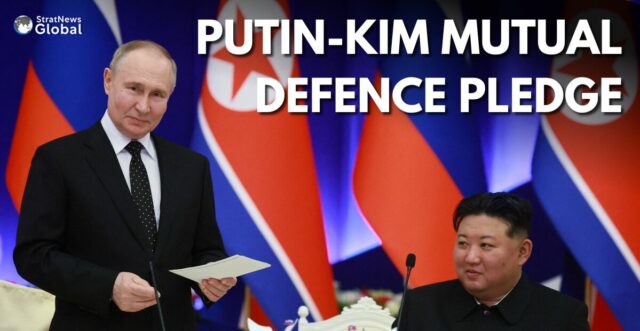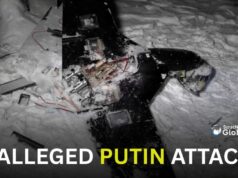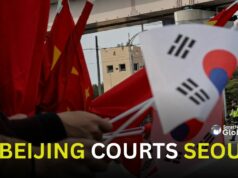North Korea and Russia have agreed to provide immediate military assistance to each other in the event of armed aggression. This significant development was disclosed by Pyongyang on Thursday, after Russian President Vladimir Putin’s left after his visit. The newly signed “Treaty on Comprehensive Strategic Partnership” revives a mutual defence agreement from the 1960s.
Details of the Agreement
The treaty, signed by Putin and North Korean leader Kim Jong Un on Wednesday, represents one of Moscow’s most notable moves in Asia in recent years. Putin’s visit to North Korea follows his recent trip to China and current visit to Vietnam.
Article 4 of the agreement states, “If either side faces an armed invasion and is in a state of war, the other side will immediately use all available means to provide military and other assistance in accordance with Article 51 of the U.N. Charter. And the laws of each country.” Article 51 of the U.N. Charter allows member countries to take individual or collective self-defence action.
Kim Jong Un echoed Putin’s sentiments, linking their deepening ties to combating the “hegemonic and imperialist” policies of the West, particularly the United States and its support for Ukraine.
International Reactions and Implications
The impact of this agreement on Russia’s ongoing conflict with Ukraine remains uncertain. Washington and Seoul have expressed alarm over the growing military cooperation between Russia and North Korea. They accuse the two of violating international laws by allegedly trading arms for use against Ukraine. Ukrainian officials have reported finding North Korean missile debris in their country. That’s a claim both Russia and North Korea deny.
The treaty also stipulates that neither nation will sign agreements with third countries that infringe on the other’s interests. Additionally, they will not allow their territories to be used to harm each other’s security and sovereignty. The agreement includes provisions for joint actions aimed at “strengthening defence capabilities to prevent war. And ensure regional and international peace and security.”
Reactions from Global Powers
South Korea’s Foreign Ministry expressed regret over the agreement. Seoul highlighted concerns about military technology cooperation. It argues the arms trade violates U.N. Security Council resolutions on North Korea’s weapons programmes. Japan has expressed “grave concerns” about potential military technology cooperation between Russia and North Korea.
China, North Korea’s primary political and economic ally, has reacted with muted concern. Meanwhile, NATO Secretary General Jens Stoltenberg highlighted the pact as an example of authoritarian powers aligning.
Ukrainian presidential aide Mykhailo Podolyak criticised Russia, a permanent member of the U.N. Security Council. He described the agreements as the nullification of sanctions against North Korea that are intended to curb its weapons development.
Broader Strategic Cooperation
On his first visit to Pyongyang since 2000, Putin thanked Kim for his support of Russian policies. Kim reaffirmed his “unconditional” support for Russia, including Putin’s war with Ukraine. The agreement also covers cooperation on nuclear energy, space exploration, food and energy security.
Cha Du Hyeogn, a former South Korean government official and current fellow at the Asan Institute for Policy Studies reacted to the pacts. He noted the mutual defence pledge mirrors the 1961 treaty between North Korea and the Soviet Union. However, he feels the reference to the U.N. Charter and each country’s laws leaves room for interpretation. He also raised questions about whether the agreement constitutes a formal alliance.
(With inputs from Reuters)
Research Associate at StratNewsGlobal, A keen observer of #China and Foreign Affairs. Writer, Weibo Trends, Analyst.
Twitter: @resham_sng





